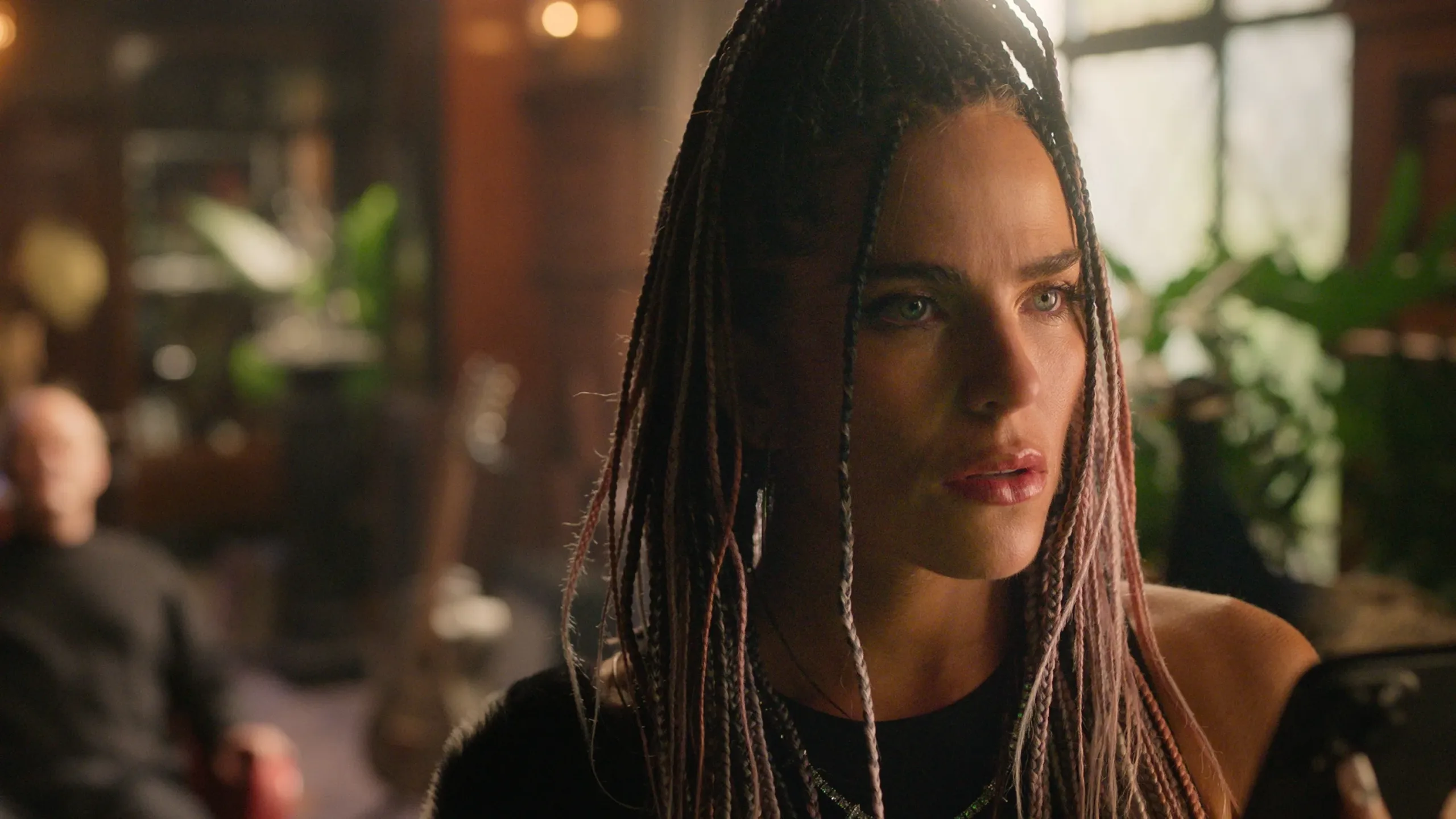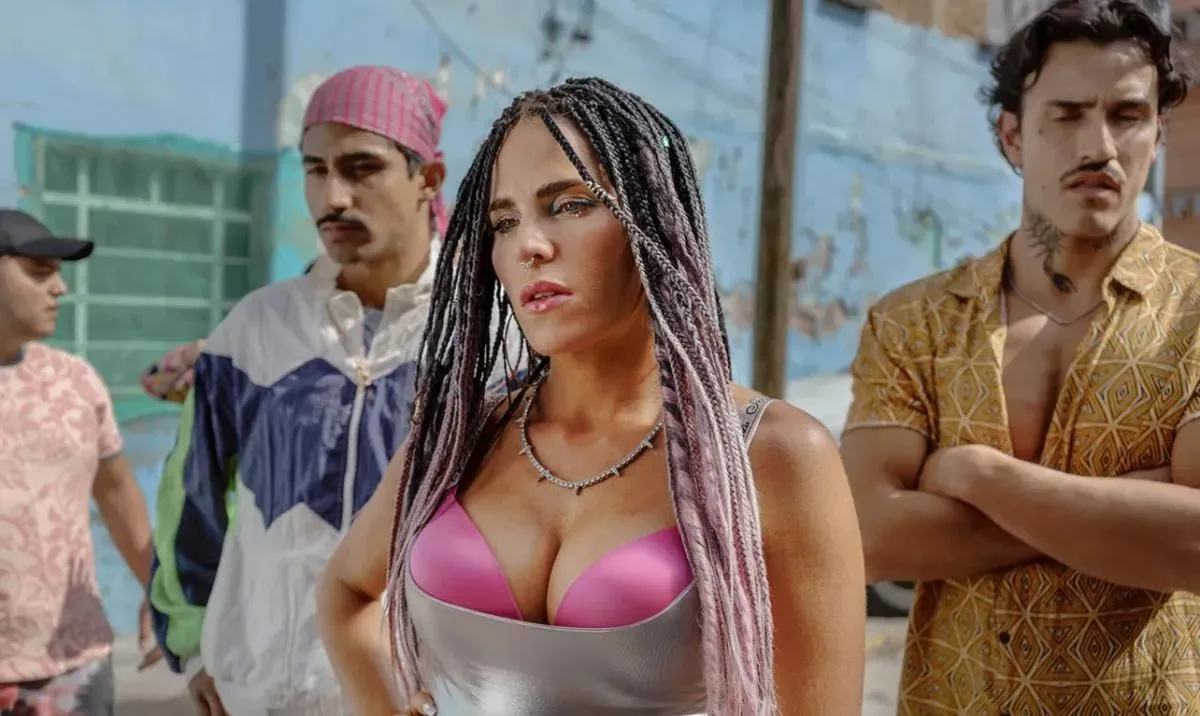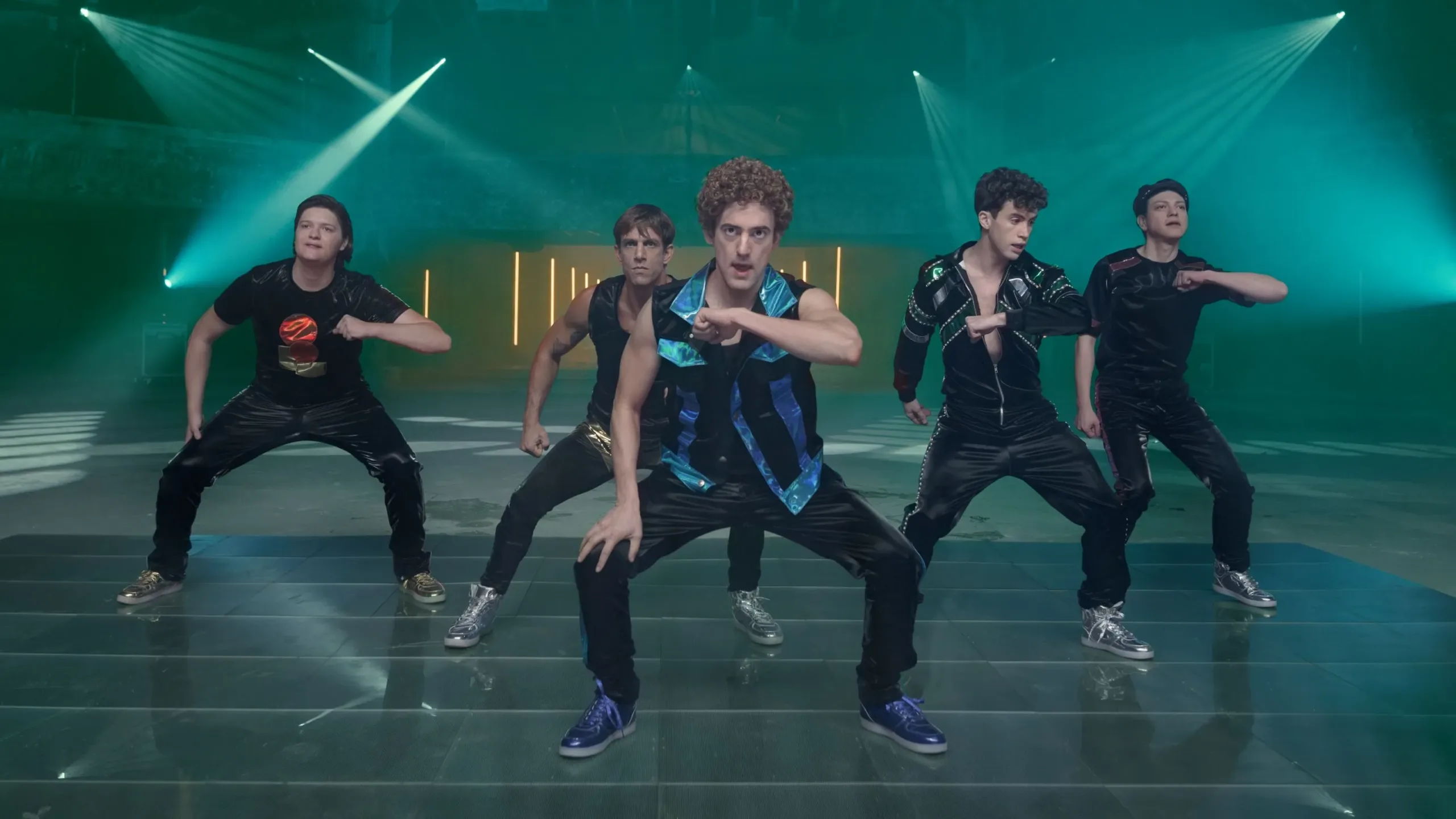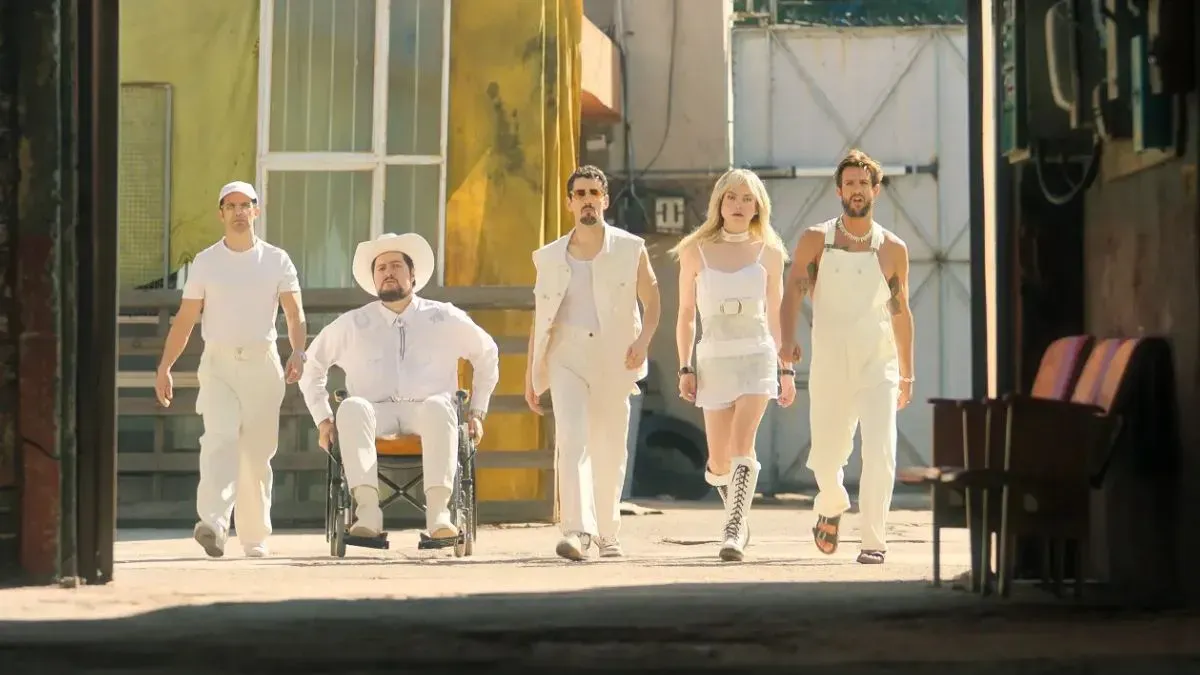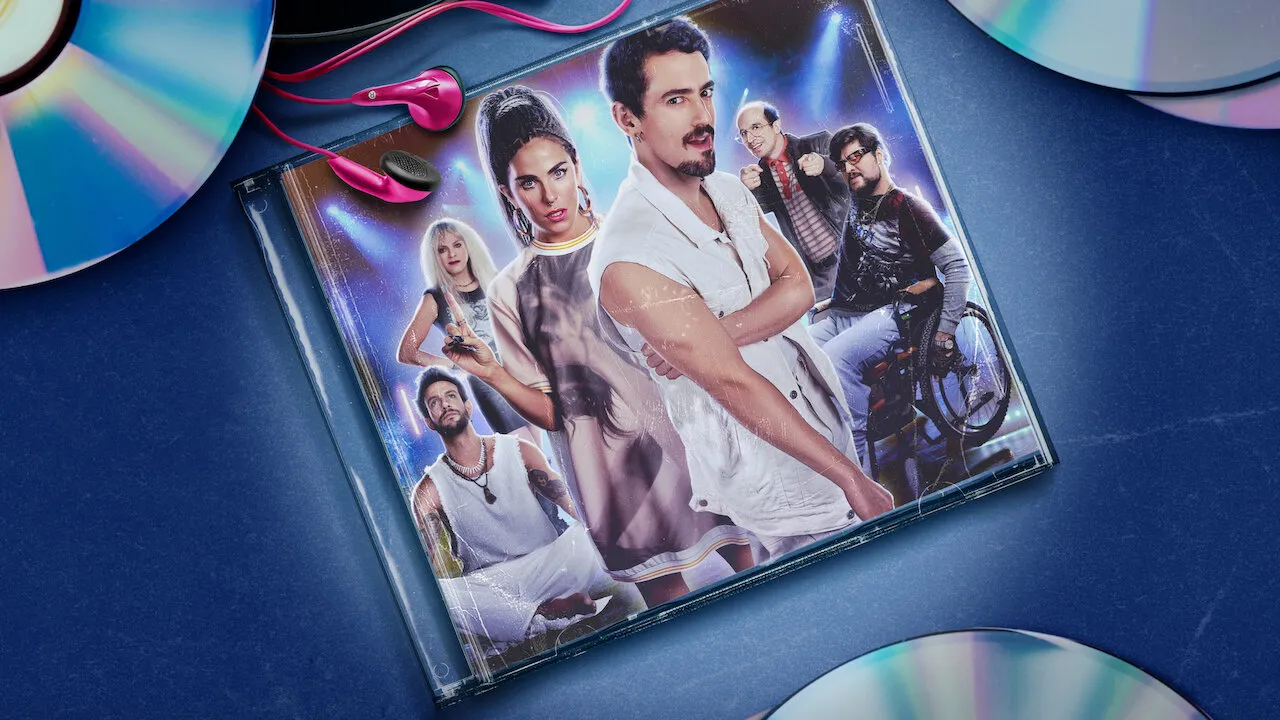Netflix’s Technoboys is a comedic look at what happens when boy band dreams crash into midlife reality. It is messy but funny, and it takes a comedic look at the world of failed pop stars. For the first time, Luis Gerardo Méndez directs this Mexican comedy. He also stars as Alan, the desperate former lead singer of the hugely famous band Technoboys.
The movie takes place after the boy band era and is about Alan’s silly quest to find his lost teammates and get back to his former glory. Imagine a reunion in pop music that is less of a triumphant return and more of a funny train wreck. Alan finds out that the Technoboys have changed over the years: Babyface is now balding, Leo has become a mysterious teacher who seems to be able to teleport people, Freddy lives in a wheelchair, and Charlie has changed his name to Charlis.
Motivated by ego and delusion, Alan gets his old bandmates to get back together under the Technoboys name to win back Melena, the pop star ex-lover now married to their old boss. The reunion isn’t just about music; it’s a crazy trip of rebirth that looks at identity, fame, and the harsh realities of a music business that never stops.
The movie pokes fun at common themes in pop culture, boy band nostalgia, and modern social interactions, creating a satirical world where musical goals and hard personal changes meet. It’s both a jab and a tribute to a time in music that seems far away and strangely familiar.
“Technoboys” is a crazy comedy about second chances, changing yourself, and the crazy things people will do to return to their old glory. This Netflix show promises a wild ride through the remains of boy band culture, whether you’re a fan of 90s pop culture or just like seeing musical dreams fall apart spectacularly.
Satirical Soundwaves: Navigating Comedy’s Treacherous Waters
As Luis Gerardo Méndez’s first movie as a director, “Technoboys” is like a high-wire act trying to balance social commentary with hilarious comedy, sometimes falling wildly while doing so. With co-director Gerardo Gatica Gonzalez, Méndez tries to break down the boy band craze while throwing fast-paced comedic punches. The result is a messy musical mix that doesn’t always hit the right notes.
Alexandro Aldrete, the screenwriter, creates a bold and disorganized story. The story tries to balance many difficult ideas, like how cruel the music business is, gender identity, cultural appropriation, and the desperate need to be seen as important. Even though these elements could work together to make a razor-sharp satire, the way it’s usually done feels more like throwing comic spaghetti at the wall and seeing what sticks.
The movie’s story structure has trouble keeping up with the 109-minute running time, which is made up of scenes that drag more than they shine. There are funny parts that get lost in a storm of crazy comedy, and it seems like the script cares more about shock value than deep criticism. The characters, especially Alan, often feel like cartoons instead of fully developed people, which turns deeper themes into broad, sometimes awkward comic strokes.
Even though the writing has many problems, there are times when it gets it. There may be a deeper story behind the crazy comedy than meets the eye when the Technoboys go from being a marketing checkmark for diversity to a more realistic portrayal of individual differences.
The way Méndez and Gatica direct seems stuck between serious social criticism and ridiculous comedy, never quite finding the right balance. The result is a movie that’s more interesting in theory than practice. This comic symphony sometimes hits a high note and often makes funny noises.
Melodic Misfits: The Personalities Behind the Music
“Technoboys” brings together a group of people who are less musical icons and more human train wrecks, each with their problems and strange changes. Alan, played by Luis Gerardo Méndez, is in the middle. He used to be a pop star, and his ego and desperation almost ooze off the screen. The main character has a lot of problems. He is selfish, cunning, and obsessed with returning Melena and his lost fame.
Méndez gives Alan a mix of cocky arrogance and a deep-seated sensitivity that makes you cringe. His act is the perfect example of a washed-up performer: he is both crazy and strangely sympathetic. Alan’s journey isn’t just about bringing back his music; it’s also a difficult dance of reinventing himself and facing the fact that he doesn’t matter.
The band members are examples of what being in a post-boy band is like. Babyface, now bald and worn out, shows how hard it is to lose good looks. It turns out that Leo is a mysterious guru with strange magical powers, including the ability to teleport. Freddy, who became a wheelchair user after an event with a bull, shows how complicated masculinity has changed over time. Charlis, who has shifted, makes things more complicated in the group.
Melena, played by Karla Souza, is the smart pop star who has used social awareness to get what she wants. She is a perfect example of performative wokeness because she uses racial and ethnic stories to make a living.
The band’s manager, George, played by Gabriel Nuncio, adds humor. Still, his character sometimes feels more like a plot device than a fully formed person. His role changes from allowing Alan’s delusions to happen to giving occasional comedic relief.
The acts make a satirical ecosystem where cultural change, musical nostalgia, and individual egos all meet in gloriously messy ways. Each actor brings a dedicated energy to the role that improves the material and turns characters who might otherwise be one-dimensional into complex, if completely silly, people.
Punchlines and Pop Punches: Satirical Soundwaves
“Technoboys” goes from funny to very funny with the ease of a boy band dance move. The movie’s humor alternates between biting social commentary and broad, sometimes cringe-worthy comedy, making for an interesting and awkward satirical setting.
The comedy mostly pokes fun at the shallow environment of the music business, making fun of everything from performative diversity to how quickly fame can fade. It’s a constant attack on how the business works, treating artists like things instead of people. The movie does a great job of making fun of how identity is sold in pop culture, with characters like Melena using her “racial awakening” to get ahead in her work.
For laughs, the movie doesn’t mind going off the rails. Drug-induced hallucinations, people throwing up in a row, and situations that are meant to be ridiculous are used as tools for comedy. A lot of the time, the jokes are almost offensive because they touch on sensitive topics like race politics, gender identity, and toxic masculinity. Funny people walk on a tightrope and don’t always fall gracefully.
The movie’s handling of sensitive subjects feels like it was meant to be shocking. Some characters use racial slurs and act in stereotypical ways, which makes it hard for viewers to tell if these are real criticism or just shock humor. This lack of clarity is the most interesting and troubling thing about the movie.
Slapstick moments and social commentary mix together to make a funny drink that is equal parts sharp criticism and messy excess. The humor often comes from how silly it is that the Technoboys are trying to stay relevant in a world that has changed so much around them.
In the end, the comedy works best when it finds real moments of weakness beneath the jokes, showing how desperate people are that they make such stupid decisions. It’s a comedic journey that shows that you can change things, even if the way is hilariously hard.
Remix of Identity: Breaking Musical Molds
“Technoboys” is more than a funny trip through boy band memories. It’s also a deep look at how people change in a business that always needs new ideas. The movie shows how artists live their lives after being famous and how they deal with fame, identity, and staying alive.
Each band member shows a different way of reinventing yourself. Charlie’s name change to Charlis makes a strong statement about gender identity and choosing for oneself. Leo’s change into a mysterious guru is a way to escape standard male roles. Freddy’s journey after a traumatic bully-goring event questions ideas about disability and strength. These aren’t just character lines; they say deep things about how people can grow beyond what society expects of them.
The music business is a harsh background for these human stories. “Technoboys” shows how artists are treated like goods in the entertainment industry, who promote them and then get rid of them when they don’t fit marketable models. Alan’s desperate attempt to become important again becomes a metaphor for how hard it is to stay important in culture.
Social problems are used to make people laugh and think. The movie has a very sharp edge when it comes to issues of diversity, cultural borrowing, and “performative wokeness.” Melena’s character is a great example of this because she uses her “cinnamon” skin tone and supposed representation to help her job. The movie makes a sharp point about how minority identities are often used as marketing tools.
In the end, the story suggests that real change doesn’t come from desperately seeking past glory or approval from others but from being yourself. Each character’s story shows how strong people can be; it’s messy and complicated but hopeful in the end.
Mixing real social commentary with comedy, “Technoboys” goes from being a simple spoof to a complex look at identity, fame, and how hard it is to stay true to yourself in a business that always wants you to fit in.
Sonic Nostalgia: Melodic Memories and Mockery
“Technoboys” treats its musical parts with the same disrespectful spirit that runs through its whole story: it’s part true tribute, part cruel spoof. The music becomes a character in and of itself, capturing the spirit of boy band culture in the late 1990s while tearing down its shiny exterior.
Alan’s singing performances perfectly capture the funny heart of the movie. His solo performances in increasingly desperate places like mall food courts wonderfully show the sad fall of a once-famous pop star. These parts are less about how great the music is and more about showing how desperate people are when their fame has faded.
The original songs purposely switch between painfully copied boy band songs and self-aware musical criticism. Because the band has a difficult relationship with their musical history, these songs are made to sound both nostalgic and cringe-worthy. Each song is like a sound time capsule that both honors and makes fun of the musical age that gave rise to the Technoboys.
Even though the music might not have any big hits, its real value comes from telling a story. The music makes the story funny by showing what drives the characters, how silly some industries can be, and how desperately people want to stay relevant.
The idea behind the movie’s music is similar to its main message: enjoy the silly, rejoice in change, and never take yourself too seriously. It’s not about perfect pitch but how it makes you feel. It’s a lesson that the most memorable music comes from places you least expect them to.
Visual Rhythms: Crafting Comedic Chaos
The visual style of “Technoboys” is just as crazy and unpredictable as its characters. The movie has technical parts that make it even more crazy and funny. The cutting is meant to evoke the crazy energy of boy band music videos, creating a visual language that is both nostalgic and well-controlled.
The film’s cinematography alternates between intimate shots in the style of a mockumentary and over-the-top visual scenes. The teleportation scenes, especially the ones where Leo changes into a different animal, are technical playgrounds where comedy and creative photography meet. At these points, it’s not so much about having perfect special effects as it is about catching the absurdist spirit of the story.
The lighting and color scheme are very important to the story. The visual style moves between the clean, business-like music business and the band members’ more personal, messy lives. As scenes change, a moving energy keeps viewers both confused and interested.
Sound design is now another tool for making people laugh. The film’s satirical tone is boosted by purposely cheesy musical transitions, off-key vocal acts, and carefully planned audio moments. Each technical choice feels made on purpose and fits into the larger story of remaking and making fun of things.
There is a thin line between purposeful amateurism and real craftsmanship in the technical performance. Flaws aren’t mistakes; they’re clever ways to make people laugh. Often, camera angles show people at their weakest, turning technical choices into plot twists.
The technical parts of “Technoboys” ultimately demonstrate the show’s main idea: enjoy the mess and the unexpected and never take anything too seriously.
The Review
Technoboys
"Technoboys" is an uneven but interesting look at identity, pop culture, and musical nostalgia. The first movie Luis Gerardo Méndez directed isn't a polished comedy. Instead, it's more of a crazy carnival of social criticism wrapped in the glittery remains of boy band excess. Most of the movie works when it shows real humanity beneath the silly jokes, like when it shows how hard it is for artists to stay relevant in a business that is always changing. Even though not every joke works and the story sometimes falls apart, there's a contagious energy and a brave openness that keeps people watching. Even though it's not perfect, this movie clearly states how people change, how culture shapes us, and the strange journey of reinventing ourselves. People who see it are asked to laugh, cringe, and finally think about how we build and break our identities.
PROS
- Bold and innovative approach to social commentary
- Strong performances, especially by Luis Gerardo Méndez
- Unique blend of comedy and social critique
- Nuanced exploration of identity and reinvention
- Clever satirical take on the music industry
CONS
- Uneven pacing
- Some jokes fall flat or feel forced
- Potentially offensive humor that might alienate some viewers
- Narrative sometimes lacks coherence
- Overreliance on shock value comedy









































